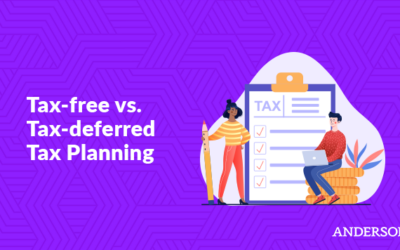There are a lot of people who aren’t afraid to do their own taxes and there are those that get professional help through a tax advisor. Most people don’t try to fix their vehicle by themselves, they get a mechanic. Home improvement jobs are, more often than not, are completed by a carpenter. But strangely enough, when it comes to filing taxes, many people assume they can just do it on their own without a tax advisor.
10 Signs It’s Time to Hire a Tax Advisor
- You Own a Business or Rental Property
- You Earn More Than $200k per year
- You Sold a Short-Term Investment
- You’re Going Through Life Changes
- You’re Concerned About the Future
- You’re Not Happy with How Much You Pay in Taxes
- Accounting Is Taking Up Too Much of Your Time
- Your Business is Growing
- You Owe Back Taxes
- You’re Getting Audited
It’s easy to see why so many taxpayers take filing taxes into their own hands. After all, it quickly becomes apparent that tinkering with a car motor, building a deck, and removing a cyst are all tasks that will end up with poor results if you don’t know what you’re doing. But tax filing paperwork is available. There are even electronic versions that purport to make everything easier. The problem is that the accessibility of tax filing material is deceptive because there is a lot more to filing taxes than meets the eye. The average taxpayer is not familiar with the tax code put forth by the IRS, nor do they know about all the tax breaks they can take advantage of. That’s where a tax advisor comes in.
A tax advisor is someone who is familiar with tax law. A good tax advisor is familiar with the tax laws in your state, and a great tax advisor is one who gets to know you, your business, and life goals so that they can help you create a tax strategy that’s strategic. They will also be familiar with your particular business and the tax laws and tax breaks that specifically apply to it.
What Does a Tax Advisor Do?
A tax advisor has familiarized themselves with the tax code and all relevant changes to it on a yearly basis. They advise their clients on ways to structure their business operations. They provide insight about the different tax deductions their client can take advantage of, and give advice on how to secure more tax deductions. In short, they help their clients create a tax strategy that helps them keep as much money as possible.
10 Signs It’s Time to Hire a Tax Advisor
Not only does hiring a tax advisor save you money in the long run, it can reduce the amount of work and headaches as well. Here are nine signs it’s time to hire a tax advisor:
1. You Own a Business or Rental Property
If you own a business, you are probably very caught up in running its day-to-day operations—ordering inventory, scheduling your staff, training new hires, dealing with unhappy customers, and of course, marketing your business. Even if you’ve outsourced some (or all) of these concerns to third parties or employees, chances are you are still pretty busy with executive decision making or expanding the business.
The same is true if you own rental properties. Even if you have a property manager or property management team, you are still probably going to be involved in managing your assets or building your portfolio. That’s why it’s helpful to work with a tax advisor who is familiar with the ins and outs of business ownership and real estate—for example, short term rental tax deductions.
2. You Earn More Than $200k per year
If you are making double six figures every year, you are going to face steeper taxes. For example, a household making anywhere from $40,526 to $86,375 is going to have a federal tax bill of $4,664 plus 22% of the amount over $40,525. But once your income climbs above $164,926, your tax bracket is going to jump up to 32%.
And if your household income lands anywhere between $209,426 to $523,600, you’re looking at a tax bill of $47,843, plus 35% of the amount over $209,425. That’s a sizable amount of money. And, as it turns out, it’s one that you don’t have to pay if your earnings are structured a certain way. This is especially true if you are self-employed. A tax advisor can show you how to write off business expenses. These deductibles will lower your taxable income, and possibly bring it down to a less punitive tax bracket. Even if you are employed, a tax advisor can assist in looking for tax breaks that still relate to your situation.
You might be wondering why the aforementioned examples of tax bills are not straightforward. This is because the tax code has created a progressive tax system—not in terms of progressive politics (although some might argue that), but in terms of increasing the tax rate as your income increases. This is also what is known as a marginal tax rate, where the last dollar earned (the margin) is taxed more than the first dollar earned.
Once your income starts getting into six figures, and especially double six figures, the marginal tax rate is going to hit you at rates in the mid to high thirties. Can you imagine paying that kind of interest on a credit card? You have to work with a tax advisor to brainstorm ways to take advantage of tax credits and tax deductibles, which lower your taxable income.
Free Strategy Session with an Anderson Advisor
Receive a detailed risk assessment to assist in lowering problem areas that could wipe out all of your assets with one wrong move. Speak with an Anderson Professional Advisor to get your FREE Strategy Session. Limited-Time offer: FREE (a $750 value.)
3. You Sold a Short-Term Investment
If you’ve sold a short-term investment, it’s going to fall into the category of short-term capital gains. In order to avoid the short-term capital gains tax applied to assets bought, held, and sold within a year, you will need to get creative.
For instance, if the asset is a piece of real estate (like residential or commercial real estate) you can do a 1031 exchange and put the proceeds of the sale into a new asset. Or, you may be able to offset the profit made from the sale of the asset with related tax deductions your accountant or tax advisor can help you find.
However, the best part of having a tax advisor on retainer is that they will help you avoid getting into a situation where the sale of an asset triggers unwanted taxes by teaching you how to structure your business and investment operations to protect cash flow.
4. You’re Going Through Life Changes
A wedding, graduation, birth, or divorce are more than emotionally momentous occasions. They can also have serious implications on your savings, income, and tax burden. This is especially true when your taxable status changes. For example, through a marriage, divorce, or when your dependents start filing their own taxes.
A tax advisor can provide tax planning services in regards to navigating life changes from a tax-related angle—for example, setting up a retirement account for when you need to start drawing a fixed income. If you’ve gotten married, divorced, had kids, or your kids are now filing their own taxes, there are even more considerations that need to be taken into account.
5. You’re Concerned About the Future
When the time eventually comes to pass on your estate, you probably hope that your wishes will be carried out, and that it will be passed into the hands of your intended recipients in full. But the sad truth of death and taxes (life’s certainties, as they say) is that estate taxes and lawyer fees can eat away at the property one wants to bequeath.
Disgruntled relatives can also protest the line of inheritance. And, of course, if no will was written to provide a clear directive, then the probate process can be a nightmare. The entirety of that dilemma can be avoided if you work with a tax advisor who can help you avoid common estate planning mistakes.
6. You’re Not Happy with How Much You Pay in Taxes
If you’re not happy with how much you pay in taxes, you don’t have to move out of the country or set up a Swiss bank account. There are often easier solutions in terms of taking advantage of tax deductions and tax credits.
A tax advisor who is familiar with your life situation, business, and location can help you brainstorm creative and legal ways to reduce your tax bill.
You might also consider joining our Tax & Asset Protection Workshop to learn more about the legal strategies available to protect your savings and investments.
7. Accounting Is Taking Up Too Much of Your Time
Whether you are doing taxes for your own business or your personal tax return, you probably have come to realize that doing your taxes takes a lot of time. Of course, if you are employed, it can be as simple as popping the information from your W2 into tax software like Turbotax and seeing whether you’re going to owe this year or if you’ll be receiving a return.
But in order to really take advantage of the tax code, you need to invest time learning about credits and deductions. Did you know that Jeff Bezos gets a massive tax refund? If he can do it, you probably can too.
Unfortunately, most people don’t have the time to learn about the tax code, so creating a DIY strategy for your tax bill is probably not within reach. Why not pay someone else to do the hard work?
Accounting can take up even more of your time if you are doing it for your business. A tax advisor can help figure out how to deal with these types of issues and minimize your headaches.
8. Your Business is Growing
If your business is growing, it’s time to hire an accountant. An increase in revenue does not always translate to an increase in profit, especially if you’re not making changes to your tax return.
Are you writing off everything you can? Have you hired someone to perform a cost segregation analysis to take advantage of depreciation as a tax write off? Business owners are already strapped for time when business is running normal, but when business is growing, it’s even harder to find the time and mental energy to deal with accounting for estimated taxes, let alone long-term tax planning.
9. You Owe Back Taxes
In a similar vein, if you owe back taxes and need to catch up, it can be difficult to find the time and energy to do so. The Internal Revenue Service has a number of tools at their disposal to collect any unpaid income tax, whether it was because you forgot to pay your taxes entirely or you did not do your tax preparation correctly.
Unpaid taxes are a tax issue that can sometimes necessitate a tax attorney who is also an enrolled agent that can represent you to the tax authorities for tax issues like collections and appeals. But rather than hunt for tax attorneys to represent your plight, it would be better to have a certified public accountant and/or tax consultant on retainer.
Tax advisors will reduce your tax liability not only in the sense of providing tax advice, but also when it comes to avoiding compliance issues by getting all the right tax forms in order. If back taxes go unpaid, the IRS can garnish your wages (take money right out of your paycheck) or even levy money from your bank account. And many times, the back taxes they collect will have all sorts of fees and fines attached.
10. You’re Getting Audited
It doesn’t happen very often, but it does happen. A very small percentage of businesses get audited by the IRS for whatever reason. If the red flag on your tax return was not the result of something malfeasance or illegal, you should speak with a tax advisor on how to deal with this situation.
This is one reason why it’s good practice to keep business records for seven years—everything from employee payroll to receipts for merchandise. At the time of this article, the federal government is thinking of adding 70k agents to the IRS, which can be a little worrisome to anyone who owns a small business or who structures their financial activity through an S-corp. You can best believe they are hoping to catch people who don’t dot their I’s and cross their T’s, and are probably hoping that the money they make from enforcing compliance will fuel agendas coming down the congressional pipeline.
Politics aside, whether or not the growth of the IRS means a greater likelihood of auditing or not, auditing can still happen, and having a tax advisor in place before something like that happens can mean avoiding a very stressful situation where you have to dig through old paperwork to prove what you put on paper.
How to Find a Tax Advisor
Many of these questions and concerns relate to individuals who are hardworking and require a nuanced treatment of their financial life. You are not going to find the type of tax advisor you need by walking into your local HRBlock branch. These tax advisors are more than likely a tax preparer. Tax return preparers, especially those at a professional organization geared toward everyday taxpayers, typically collect payment exclusively from a W2, and are most likely going to take a cookie cutter approach to tax preparation. The only tax tips they will typically offer are those relating to well-known tax deductions.
If you own a business, invest in real estate, trade securities, or make a decent amount of money, you need something more than a one-size-fits-all firm. You need more than basic accountancy and tax tips offered by paid tax return preparers. You need a tax professional who is familiar with tax law, business structure, and tax planning options that relate to your business; whether you are a small business owner or conduct investing activities in real estate or securities.
This is where the experts at Anderson Advisors can help. We specialize in working with all types of taxpayers, from employed individuals to investors to business owners. We understand that the tax strategy for a real estate investor in Maryland is not going to be the same as a business owner in California, or a software engineer in Texas. We do not view tax consultation as a one-size-fits-all approach, but rather something that requires diligence and care.
It’s important to realize that a tax advisor is not a financial advisor or someone who can render business services. They provide small business owners (and big business owners) guidance on how to pay less taxes and keep more money in their pocket. They can advise you about the tax implications of a certain investment, but they cannot give you advice about the investment itself. There are cases in which a tax advisor is also a financial advisor with a professional credential, like a series 7 license. Alternatively, they may be able to recommend someone from within their professional network. As it applies to business services, though, a tax advisor can help you navigate issues like the tax implications of importing goods from overseas or opening a new restaurant in a different state. But they cannot help you make marketing decisions or perform executive level functioning for your business. They are available to help you with your taxes, in terms of staying compliant and maximizing how much money you save.
Tax Advisors Create Strategies for Many Different Types of Financial Situations
As you can see, there are a number of situations where it makes sense to work with a tax advisor. Whether you’re unhappy with how much you’re paying in taxes, want to make sure your business is taking full advantage of all applicable tax credits and tax deductions, or have specific questions related to the tax implications of selling a particular investment—an experienced tax advisor can ensure you’re staying legally compliant while strategically reducing your tax obligations.
No matter the reason, the tax experts at Anderson Advisors can help. Don’t put professional tax help off another day—schedule a free consultation today!
Bonus Video
Free Strategy Session with an Anderson Advisor
Receive a detailed risk assessment to assist in lowering problem areas that could wipe out all of your assets with one wrong move. Speak with an Anderson Professional Advisor to get your FREE Strategy Session. Limited-Time offer: FREE (a $750 value.)













